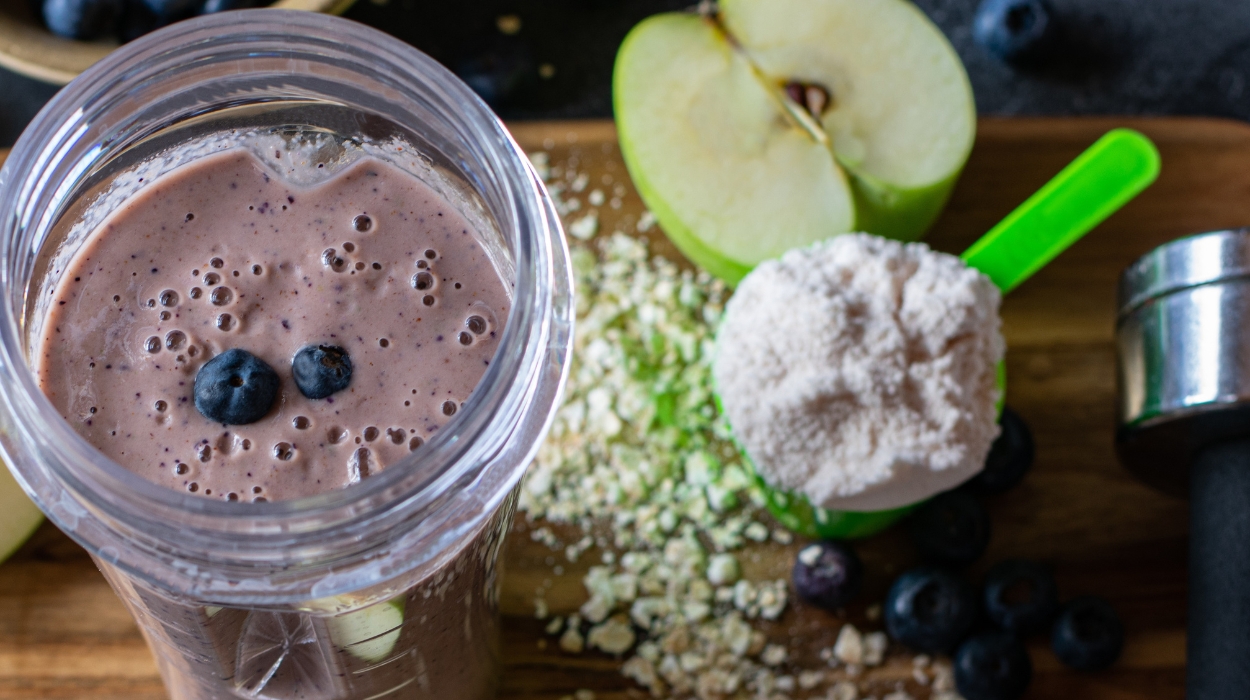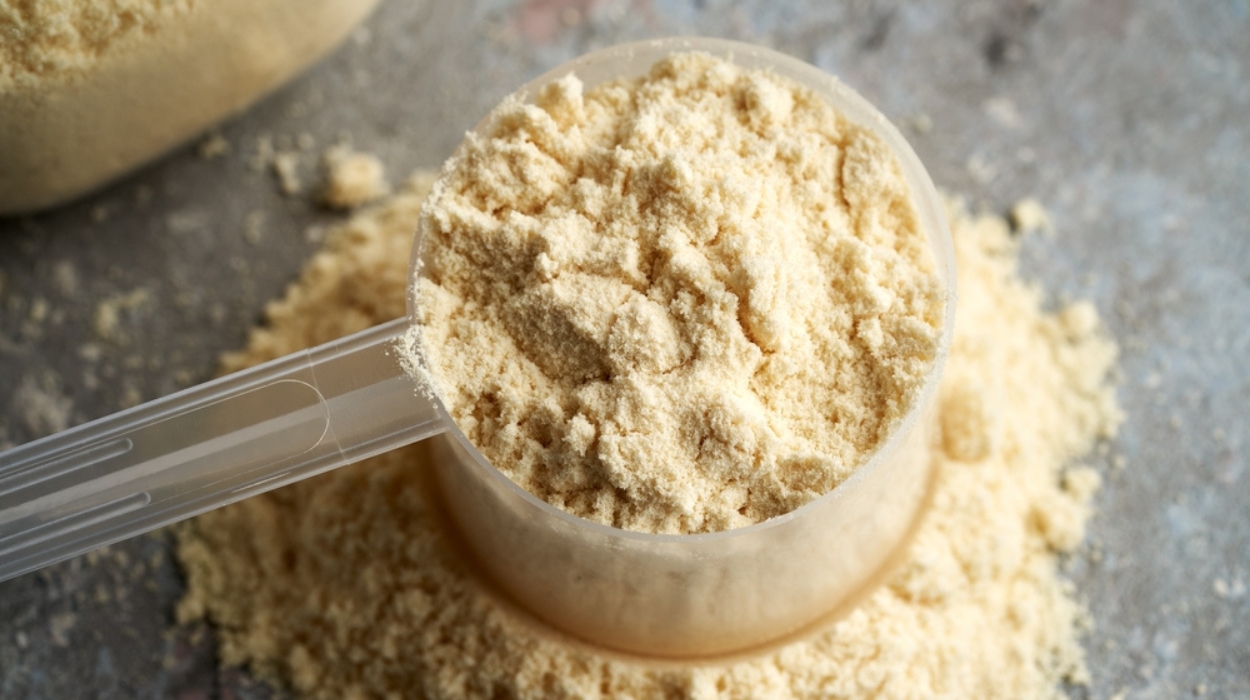There is more than one way to lose weight. However, a weight loss method does not work without proper adjustments to your diet. Still, most weight loss methods usually involve supplements to enhance the changes made in diet and support the body as it burns off excess weight.
One very popular supplement is whey protein, which commonly comes as a powder. There are many reasons why protein is important for weight loss and whey protein has all of those properties as well.
Beyond its reputation as a muscle-building supplement, whey protein has gained recognition for its potential impact on weight management. This article aims to delve into the topic of whey protein for weight loss, exploring its benefits and providing guidance on how to incorporate it effectively into a weight loss routine.
Benefits Of Whey Protein For Weight Loss
Whey protein packs a punch for weight loss. Here are some of the benefits:
- High protein content.
- Low in calories.
- Packed in nutrients.
- Preservation of lean muscle mass.
- Boosting metabolism.
Whey Protein Benefits For Weight Loss

Protein is a macronutrient with many benefits. Macronutrients are nutrients that your body needs in large quantities. The three major macronutrient classes are carbohydrates, proteins, and fats.
Proteins have numerous benefits such as preserving muscle mass and helping you feel satisfied after a meal. When it comes to weight management, protein is your best friend. By including an adequate amount of protein in your diet, you can increase your weight loss success.
But what are the benefits of whey protein for weight loss? Derived from milk during the cheese-making process, whey is a great source of protein. It all begins with milk undergoing pasteurization and the introduction of enzymes or acids to induce curdling.
This action separates the milk into curds and the liquid whey. Curds are used to make cheese, and liquid whey — containing proteins, essential amino acids, vitamins, and minerals — undergoes a series of filtration methods to remove fats and carbohydrates. This leaves behind a concentrated liquid whey solution.
Whey protein is available in powdered form, making it convenient and easy to incorporate into your protein shakes and more. So, why is whey protein good for weight loss? Here are some benefits:
Increased Satiety
High protein foods are notorious for their appetite control because they help you feel full and satisfied. So whey protein, which is a high-quality protein, can keep you fuller for longer and reduce overall calorie intake. It does this by sending signals to your brain that you’re good to go for a while.
Whey protein increases the production of glucagon-like peptide-1 which stimulates the satiety hormone,[1] so you feel fuller for longer. So, drinking whey protein supplements can help you get past a craving.
Low In Calories
The best way to lose body fat is to cut down on how many calories you eat. You should find low-calorie options of certain meals as alternatives.
Whey protein is quite low in calories,[2] at only 87 calories per scoop. This low-calorie protein powder can be taken before or after your workout. Maintaining a caloric deficit is important for losing weight.
Promotion Of Lean Muscle Mass
Another factor that is important for you to lose weight is promoting lean muscle mass.[3] Lean muscle tissue is more metabolically active than fat tissue. This means that even at rest, muscle burns more calories than fat.
With a higher metabolic rate, your body becomes more efficient at burning calories, which can aid in weight loss or weight maintenance. The leucine content in whey protein also triggers protein synthesis in muscle, helping you with muscle growth and maintenance.
Nutrient-Packed
Aside from being primarily protein, whey protein has other important nutrients as well. It contains calcium, iron, potassium, and sodium. Individually, these nutrients have benefits they confer on the body.
For example, calcium burns fat in the body, and research shows that it is helpful for weight loss. Specifically, it has been demonstrated that each 300 mg increment in regular calcium intake[4] is associated with approximately 2.5–3.0 kg lower body weight in adults.
Whey protein concentrate also has benefits for cancer patients as research[5] shows.
Boosts Metabolism And Fat-burning
Proteins, including whey, can boost your metabolism[6] due to the thermic effect of food.[7] When you consume protein, your body kicks into high gear to break it down and process it. Protein digestion demands more energy than handling carbs or fats.
So whey protein boosts metabolism by revving up your calorie expenditure, which translates into more calories burned, helping you inch closer to your fat-burning goals. Research[8] shows this is more effective alongside resistance training in a weight loss program. It also helps that whey protein is low in fat at only 1.2 grams per scoop.[2]
How To Use Whey Protein For Weight Loss

Now, how do you use whey protein for weight loss? With countless options on the market, choosing the right whey protein can feel overwhelming. But fear not, we’re here to simplify it for you.
First, ensure you get the correct product. Look for a high-quality whey protein powder without any unnecessary additives or sweeteners. Opt for a whey protein isolate if you’re lactose intolerant or prefer a lower-carb option.
Whey protein intake for weight loss can be incredibly convenient due to its quick absorption and versatility in various recipes, meaning that adding whey protein to your diet doesn’t have to be monotonous. Here are three delicious recipes that can help you include whey protein while aiming for weight loss:
Whey Protein Smoothie
Smoothies are great for the recharge-and-go moments — especially when you have them for breakfast or as a meal replacement. Here is how to make a simple smoothie with whey protein:
Ingredients:
- One scoop of whey protein powder (vanilla or chocolate).
- 1 cup of unsweetened almond milk.
- 1/2 cup of frozen berries (strawberries, blueberries, or raspberries).
- One tablespoon of chia seeds.
- One handful of spinach (optional for added nutrients).
- Ice cubes (optional).
Instructions:
1. Combine all the ingredients in a blender.
2. Blend until smooth and creamy.
3. Pour into a glass and enjoy as a nutritious and filling meal replacement or snack.
Protein-Packed Oatmeal
Oatmeal is also a great, high-protein snack for healthy eating and weight loss when it contains ingredients such as whey protein. It is also high in fiber,[9] which may also help with weight loss. Here is how to make a simple, protein-packed oatmeal:
Ingredients:
- 1/2 cup rolled oats.
- 1 cup water or unsweetened almond milk.
- 1 scoop of whey protein powder (vanilla or chocolate).
- 1 tablespoon of natural peanut butter or almond butter.
- Cinnamon for added flavor (optional).
- Fresh berries or sliced bananas for topping (optional).
Instructions:
1. Cook the oats in water or almond milk according to package instructions.
2. Once cooked, stir in the whey protein powder and mix until well combined.
3. Add in peanut butter or almond butter and any desired sweetener or spices.
4. Top with fresh fruit and enjoy a satisfying, protein-packed breakfast.
Protein-Packed Greek Yogurt Parfait
A parfait is another rich snack that anyone looking to lose weight can enjoy, as they are versatile with multiple possible ingredients. They are also convenient and easy to make. Here is the recipe:
Ingredients:
- 1 cup of plain Greek yogurt.
- 1 scoop of whey protein powder (vanilla or flavored).
- 1/4 cup of mixed nuts and seeds (almonds, walnuts, chia seeds, etc.).
- 1/2 cup of mixed berries.
- Honey or maple syrup (optional).
Instructions:
- In a bowl, mix the whey protein powder into the Greek yogurt until well combined.
- Layer the protein-infused yogurt with mixed nuts/seeds and berries in a glass or bowl.
- Repeat the layers and finish with a drizzle of honey or maple syrup if desired.
- Enjoy a nutrient-dense and filling snack or dessert.
Best Time To Take Whey Protein For Weight Loss
To maximize the weight loss benefits of whey protein, it’s ideal to consume it between meals. This strategy can potentially trigger the release of hormones[10] like glucagon-like peptide-1, peptide YY, and cholecystokinin, known for reducing appetite.
Incorporating a protein-rich snack between meals might lead to a decreased calorie intake later in the day. For instance, research[11] showed that individuals who had a high-protein snack in the afternoon consumed around 100 fewer calories at dinner than those who opted for crackers or chocolate as their afternoon snack, despite all snacks providing the same number of calories.
So, the best time to take whey protein for weight loss is in between your daily meals and snacks. This approach can curb cravings and reduce overall calorie intake, positively contributing to weight loss efforts.
Is Whey Protein Good For Weight Loss?
After coming this far, the burning question remains: is whey protein good for weight loss? Yes, it is good for weight loss.
Here are the three whey protein products that are the best for weight loss:
- Whey protein concentrate: This is the most common form[12] of whey protein. It contains low levels of fat and carbohydrates and is typically 70-80% protein by weight.
- Whey protein isolate: This is a more processed form[5] of whey protein that contains at least 90% protein by weight. It is often used by athletes and bodybuilders because it is low in fat and carbohydrates.
- Whey protein hydrolysate: is a pre-digested form of whey protein that is rapidly absorbed by the body. It is often used because it is easy to digest.[13]
If you want to lose weight, you may benefit from whey protein concentrate, which is the most common and affordable form of whey protein. It contains 70-80% protein by weight and some fat and carbohydrates, which can help you feel fuller and more satisfied.
Conclusion
As we have seen, whey protein has numerous benefits, from curbing hunger to boosting metabolism. These benefits make it a valuable addition to a weight loss journey. The versatility of whey protein, found in various forms, allows for easy integration into daily meals and snacks.
As a versatile and beneficial supplement, whey protein stands as a scientifically supported tool for those pursuing weight loss goals. When combined with a balanced diet and exercise, it can notably contribute to a successful weight loss journey.
Frequently Asked Questions
Whey protein, combined with a balanced diet and exercise, can aid in overall weight loss, potentially reducing belly fat.
Aim for 20-25 grams of whey protein per serving, 1-2 servings a day, as part of a weight loss plan.
Protein alone doesn’t burn fat significantly without exercise; its effects are more pronounced when combined with physical activity.
In some cases, excessive consumption may lead to digestive issues like bloating or discomfort; moderation is key to avoiding adverse effects.
 Evidence Based
Evidence Based
